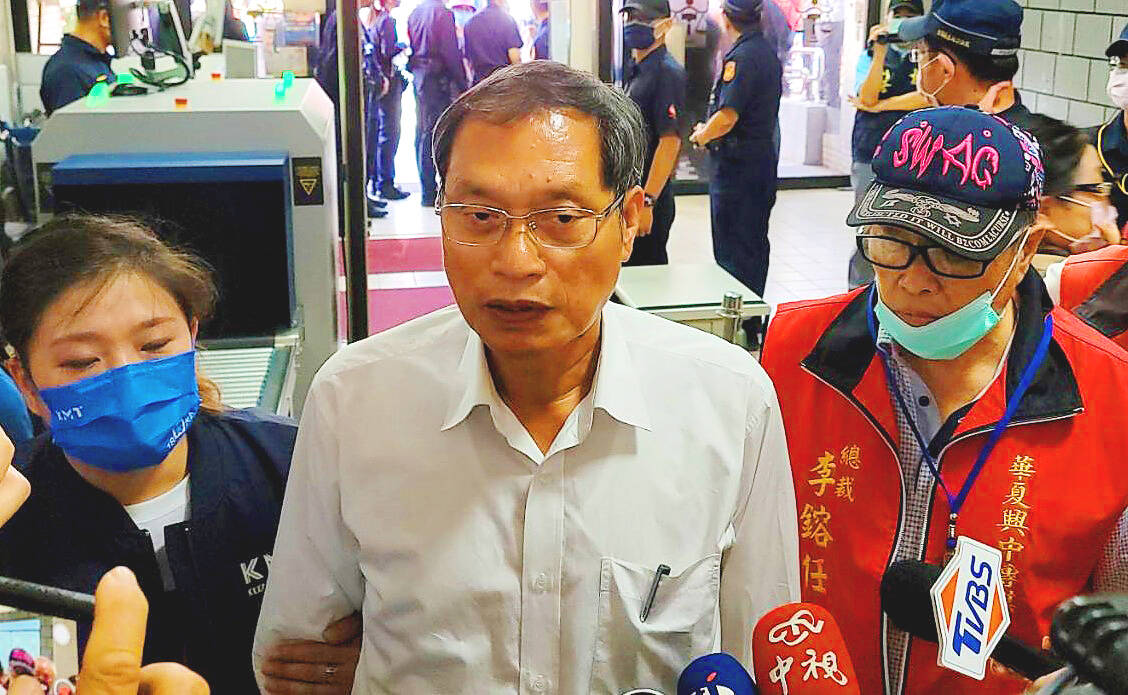The Pingtung District Court on Thursday dismissed a request for a recount by Su Ching-chuan (蘇清泉), the Chinese Nationalist Party’s (KMT) Pingtung County commissioner candidate in the Nov. 26 local elections.
Su lost to Democratic Progressive Party Legislator Chou Chun-mi (周春米) by a margin of about 11,000 votes, or 2.5 percent, prompting him to file a request with the court that ballots be secured and recounted.
The Civil Servants Election and Recall Act (公職人員選舉罷免法) sets a 20-day deadline for the district court in the respective jurisdiction where the election is held to order a recount.

Photo: Yeh Yung-chien, Taipei Times
The court last month rejected Su’s request that the ballots be secured, and on Tuesday launched an investigation into whether a recount was warranted.
It ruled against Su’s recount request, saying that the margin by which he lost was wider than the 0.3 percent limit set by the act that warrants a recount.
After the ruling, Su said he had filed a lawsuit against the Pingtung County Election Commission requesting that the election result be invalidated.
He said that more than 13,000 votes had been counted despite being invalid, adding that the vote count was “rife with illegalities and errors.”
Asked whether he would appeal Thursday’s ruling, Su said he would consult with his lawyer before making a decision.

A preclearance service to facilitate entry for people traveling to select airports in Japan would be available from Thursday next week to Feb. 25 at Taiwan Taoyuan International Airport, Taoyuan International Airport Corp (TIAC) said on Tuesday. The service was first made available to Taiwanese travelers throughout the winter vacation of 2024 and during the Lunar New Year holiday. In addition to flights to the Japanese cities of Hakodate, Asahikawa, Akita, Sendai, Niigata, Okayama, Takamatsu, Kumamoto and Kagoshima, the service would be available to travelers to Kobe and Oita. The service can be accessed by passengers of 15 flight routes operated by

MORE FALL: An investigation into one of Xi’s key cronies, part of a broader ‘anti-corruption’ drive, indicates that he might have a deep distrust in the military, an expert said China’s latest military purge underscores systemic risks in its shift from collective leadership to sole rule under Chinese President Xi Jinping (習近平), and could disrupt its chain of command and military capabilities, a national security official said yesterday. If decisionmaking within the Chinese Communist Party has become “irrational” under one-man rule, the Taiwan Strait and the regional situation must be approached with extreme caution, given unforeseen risks, they added. The anonymous official made the remarks as China’s Central Military Commission Vice Chairman Zhang Youxia (張又俠) and Joint Staff Department Chief of Staff Liu Zhenli (劉振立) were reportedly being investigated for suspected “serious

ENHANCING EFFICIENCY: The apron can accommodate 16 airplanes overnight at Taoyuan airport while work on the third runway continues, the transport minister said A new temporary overnight parking apron at Taiwan Taoyuan International Airport is to start operating on Friday next week to boost operational efficiency while the third runway is being constructed, the Ministry of Transportation and Communications said yesterday. The apron — one of the crucial projects in the construction of the third runway — can accommodate 16 aircraft overnight at the nation’s largest international airport, Minister of Transportation and Communications Chen Shih-kai (陳世凱) told reporters while inspecting the new facility yesterday morning. Aside from providing the airport operator with greater flexibility in aircraft parking during the third runway construction,

Taiwanese and US defense groups are collaborating to introduce deployable, semi-autonomous manufacturing systems for drones and components in a boost to the nation’s supply chain resilience. Taiwan’s G-Tech Optroelectronics Corp subsidiary GTOC and the US’ Aerkomm Inc on Friday announced an agreement with fellow US-based Firestorm Lab to adopt the latter’s xCell, a technology featuring 3D printers fitted in 6.1m container units. The systems enable aerial platforms and parts to be produced in high volumes from dispersed nodes capable of rapid redeployment, to minimize the risk of enemy strikes and to meet field requirements, they said. Firestorm chief technology officer Ian Muceus said